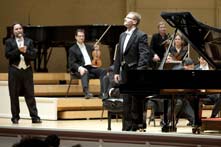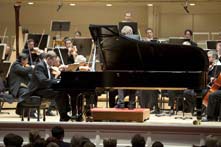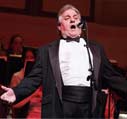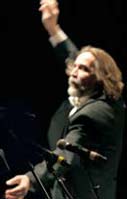Although his universality and ability to transcend mere national boundaries propelled Frederic Chopin to the first rank of piano composers, it is the reality that the rest of us all know and love him and that he just happens to be one of their own that makes him a particularly beloved figure to his fellow Poles.
Where else but in Chicago — home to more Poles than any other city outside of Poland,– could you possibly attend an epic gala Chopin bicentennial salute that includes not only a top-notch young Polish pianist and veteran operatic tenor from the homeland, but a Polish soprano, conductor, dancers?
Barry Manilow aside, one doesn’t think of Chopin as a song composer, but he did in fact write an entire set of twenty songs, Op. 74. The poetry is rarely profound, but what is striking is Chopin’s melodic imagination and the restraint of his piano accompaniment. Of the four settings presented, two were orchestrated, a needless distraction that also had the unfortunate effect of drowning out soprano Miroslawa Sojka-Topor in perhaps the best-known song of the set, the waltz-like A Wish. She fared better with piano alone in the haunting ballad Melody.
Tenor Jozef Homik is a veteran superstar of the Polish opera stage, and while size may somewhat inhibit his movement these days, that was cleverly compensated for in this case by surrounding him with a battery of beautiful, young Polish female dancers in folk costumes sporting buckets while he rendered the playful drinking song Hulanka. Homik’s master ability as a storyteller was revealed in A Warrior, his crisp diction and his clarion voice carrying through the spellbound house.
The biography of young pianist Piotr Banasik includes a long list of awards and Banasik has also been the scholarship holder of the Polish Ministry of Culture of Arts. Though not made explicit anywhere on the program, this Friday night Symphony Center performance was actually listed on his own website as his United States debut.
From the moment that Banasik made his entrance in the first movement of the Chopin First Piano Concerto with a full-bodied yet delightfully delicate touch, it was clear that his gifts were to be dispensed at the service of the music. This is muscular and a young man’s Chopin, to be sure, but refreshingly transparent, never over-Romanticized or over-pedaled, Banisik preferring to use an exquisite sense of touch and phrasing to reveal melodic shape.
And yes, every note could be clearly and cleanly discerned, something rarely experienced in young pianists performing Chopin. There is often a sense even among piano veterans that Chopin is more about feelings and moods than about form and clarity, but a performance such as this reveals how much more can be gleaned from this music when those elements are attended to so conscientiously.
Rubato is everything in Chopin, and for Banasik, here, too, the music itself completely dictated his use of it. Like a great actor who knows his prose backwards and forwards, Banisik created the illusion of making up this music as he went along—a remarkable accomplishment in a work of such familiarity, with every measure sounding fresh.
Kudos, too, to conductor Wojciech Niewrzol-Victor and the Paderewski Symphony Orchestra, which provided perfect support, never overbearing or rushing Banasik along, but always there exactly when they needed to be.
The audience was clap-happy even after the second moment, but when the finale of the third movement had sounded, the ovation was immense, the standing immediate. How much of this was Polish-Americans cheering on one of their own and how much was the reaction to a clearly extraordinary performance is an open question, but it was one of those truly spontaneous moments to be savored.
Though an orchestral piece had been planned as the evening finale, Niewrzol-Victor did one of the most gracious onstage acts this listener has ever seen a colleague do for another: he surveyed the cheering crowd and then whispered in Banasik’s ear and sent him back to the piano while he and the orchestra sat watching him.
What followed — as an “encore” to the First Piano Concerto, mind you — the Polonaise in A-flat, Op. 53, the Heroic, played with immense confidence and elation and not the usual rush that is often heard here. There was immense subtlety, and again, Banasik’s rubato and touch were at the service of the music completely. It was a brilliant choice in every respect, since it served as a virtual deconstruction of an iconic warhorse.
The audience remained and kept cheering, not so much because they were unsatiated but to demonstrate how much pride and patriotism, in the best sense, they were feeling. It will not be a surprise to learn that the orchestra never played its last piece: Banasik kept coming and going, people stayed and clapped, and finally Banasik came out and did the familiar Waltz in D-flat Major, Op. 64, No. 1, the so-called Minute Waltz, which of course, even played briskly — he did so moderately — takes nearly twice that long to play.
Finally, the idea occurred to Banasik not to cater to such warhorses, or the evening would simply not end. His final encore was actually a Chopinesque equivalent of The Party’s Over Now, a more obscure and introspective ballade that diffused the evening energy with genuine poetry and satisfaction |

Piotr Banasik - Chicago Orchestra Hall

Piotr Banasik - Chicago Orchestra Hall

Piotr Banasik - Chicago Orchestra Hall

Orchestra Hall at Symphony Center

Miro Sojka Topor and Jozef Homik - Chicago Orchestra Hall at Symphony Center

Dancers from WICI and Jozef Homik

Mira Sojka Topor

Jozef Homik

Wojciech Niewrzol
|
Piotr Banasik - one of the most talented Polish pianists of the young generation. He has won numerous awards and honors in competitions in Poland and abroad, including the Grand Prize in the PARNASSOS International Piano Competition, and the Special Prize at the 15th International Chopin Piano Competition in Warsaw. Since 1998 Piotr has given countless recitals and has performed as a soloist in symphonic concerts throughout Poland, as well as in the Czech Republic, Ukraine, France, Germany, Italy, Mexico, South Africa, Switzerland, China and the United Arab Emirates.
Piotr Banasik’s technique and sensitivity is beyond measure and has been equally and enthusiastically applauded by audiences across the world. “An explosion of romantic musicality, a great show of virtuosity, and an excellent presentation of his own musical thoughts, cause the audience to ask for endless encores…” - “Gazeta Wyborcza”, Feb. 27, 2009.
The program of the March 26th concert will feature ‘Fairytale’ - Fantastic Overture by S. Moniuszko, a selection of Chopin’s Songs thus far rarely performed in the United States, and the Concert No 1 in E-minor, op.11, which Chopin wrote at age 18, and ‘Les Sylphides’.
Les Sylphides is themusic by Chopin orchestrated for ballet by Alexander Glazunov the work was premiered by Sergei Diaghilev's Ballets Russes on 2 June 1909 at Théâtre du Châtelet, Paris..
Chopin’s Songs will be performed in Polish by the renowned Polish singers Miroslawa Sojka – Topor,soprano and Jozef Homik, tenor,
Chopin we dont know
26 Portraits of Chopin
Fragments of ballet music
Valse op 64
Grande Valse Brilliante
Grande Valse Brilliante
Valse op 64
Mazurek op 67
Preludium op 28
Pressrelease |







